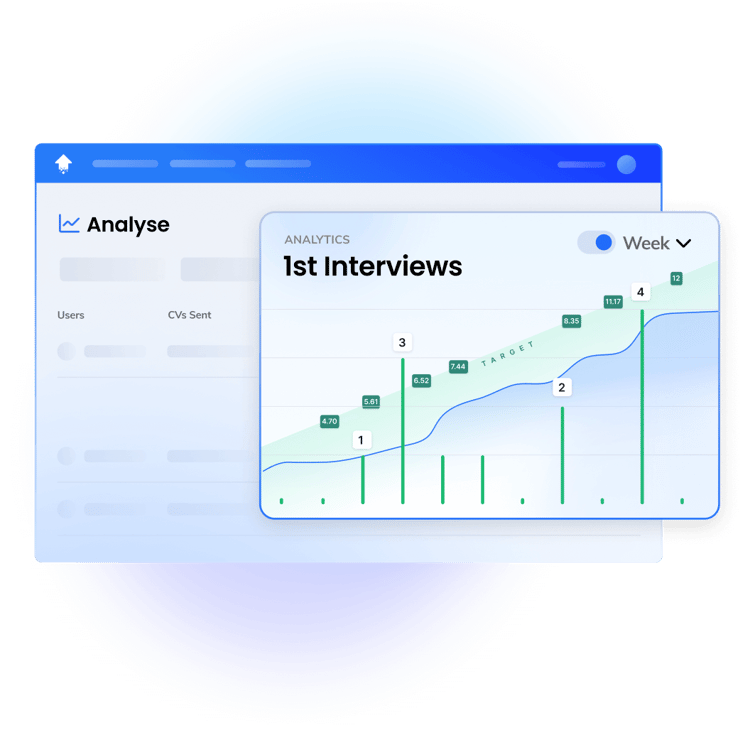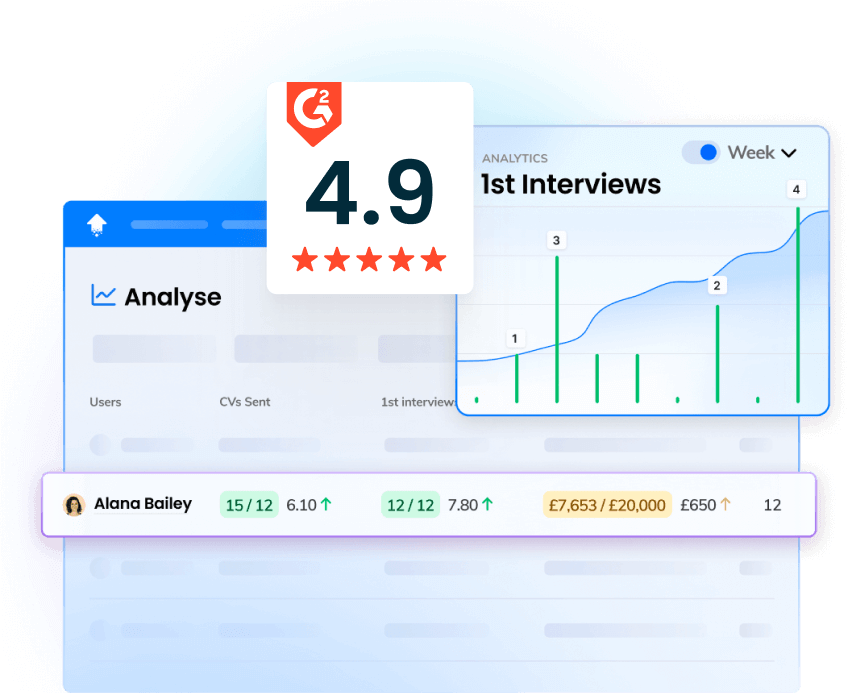Let’s face it, the recruitment industry has historically lagged behind other sectors when it comes to data.
Even in 2024, recruitment teams are struggling with a lack of visibility into their data, and too few insights into their performance.
Why?
Many are still using outdated systems, overly complex tools, and time-consuming manual alternatives like spreadsheets.
This means strategic decisions are based on gut feeling, recruiters are lacking in direction, and a huge amount of time is being wasted.
Now, with the market struggling, insights and optimal performance are critical.
Recruiters — it’s time to catch up.
And that means investing in the right recruitment analytics software for your business.
The Role of Analytics in Modern Recruitment
Smart recruiting analytics software can solve a whole host of common recruitment challenges.
In recruitment agencies, for example, analytics enables effective goal setting and real-time progress tracking towards these goals.
This allows leaders to focus their recruiters on key tasks, and boost productivity, efficiency, and overall performance.
Analytics gives recruiters an overview of their recruitment funnel so they can identify any leaks or blocks and take swift action to resolve these issues.
Recruitment analytics can also be used for forecasting, trend spotting, and data-driven decision making, which is a lot more effective than simply going off gut feeling.
Furthermore, recruiters can deliver higher quality candidates through data-driven skills assessments and job simulations, while historic data can point you in the direction of the best fit for a vacancy.
Top 20 Recruitment Analytics Tools for 2024
Read on for our list of the top recruitment analytics tools to help you meet your goals in 2024.
1. OneUp

OneUp is a top recruiting analytics software for tracking, understanding, and driving recruiter and agency performance.
The perfect solution for recruitment agencies, leaders are empowered to build high-performance teams through an intuitive suite of tools that visualise data in real-time.
Features include real-time custom dashboards that track progress towards individual recruiters’ goals, leaderboards perfect for fostering healthy competition within your agency, and intelligent automation that cuts tedious tasks from your workflows.
OneUp pulls real-time data from across your tech stack — check out its integrations here — allowing you to spend your time on the important stuff like data analysis and data-driven decision making.
Vicky Bodhani, Group General Manager at Eligio, said OneUp is used in the company’s manager and board meetings to review activity and revenue quickly — which was not possible in its CRM.
This has resulted in “far more insightful and productive” meetings, and a 600% increase in client introductions.
Read more case studies and customer experiences.
2. Recruit CRM
With Recruit CRM, recruiters can automate their workflows in order to significantly boost efficiency and leave tedious manual tasks in the past.
Recruit CRM promises candidates they will “never have to do data entry again while adding or updating candidates”.
Highlights include a Chrome sourcing extension that facilitates direct sourcing from LinkedIn, Xing, Gmail, Outlook and more, a resume parser that makes screening much simpler, and drag-and-drop Kanban boards that visualise candidate pipelines.
What’s more, the software is 100% customisable, with over 5,000 integrations.
Paul Diaz, Founder of Hire Power Consulting, described Recruit CRM as “the easiest and most customisable CRM/ATS I have ever used”, while many reviews highlight the brand’s excellent customer service.
3. ProofHub
Proofhub’s focus is firmly on projects and team collaboration.
From one platform, you can plan, track and manage projects of any size.
Proofhub encompasses time tracking tools, custom workflows, custom project templates, and files and documents.
Its visual custom analytics reports mean you can instantly see which projects are on track and stay up-to-date with progress.
Meanwhile, its collaboration centre includes a place for discussions, proofing and approval for creative projects, a notes facility, announcements, and an intuitive chat feature.
Global-Hive’s Steve O’Donnell described Proofhub as “an invaluable tool that enriches our interactions and adds real value”.
4. Kallidus Recruit
Kallidus Recruit’s Applicant Tracking System promises to streamline your recruitment process, with easy views of candidate progress from application to offer.
This is an end-to-end recruitment solution for in-house recruitment teams.
With Kalluidus, you can identify future talent, hire at scale, empower hiring managers with their own mobile portal, onboard with ease, and report for success — all from one platform.
What’s more, it offers full visibility of your recruitment analytics with an in-depth suite that covers all the major metrics, as well as candidate source tracking and instant dashboard reporting.
And save time with automation that facilitates candidate organisation and bulk emailing.
Ovidiu Neacsu, Sykes’ Global HRIS & Analytics Manager, said: “Kallidus basically did the impossible where our teams had all but accepted this as their normal.”
5. Symphony Talent
Symphony Talent delivers an integrated suite of full-funnel solutions for modern talent acquisition teams.
Vowing to “turn candidates into co-workers,” it provides tools that empower businesses to raise awareness, build connections, assess qualifications, and boost retention.
Symphony’s solutions include programmatic media advertising, career site functionality, CRM, assessments, and career development capabilities.
Chatbots, events, referrals, internal mobility sites, and video interviewing are among some of its other highlights.
Meanwhile, its recruitment analytics and insights solution centralises every paid, earned and owned source within a single data structure for improved visibility.
From this single source of truth, recruiters can measure and monitor activities, access reports with actionable insights, and optimise recruitment efforts and spending.
6. Zoho Recruit
Zoho Recruit offers a powerful ATS and CRM in one recruitment solution designed for use by internal HR teams and staffing agencies.
The CRM on this end-to-end recruitment software boasts data analysis functionality for key KPIs and delivers comprehensive sourcing summaries for each hiring channel, improving placement decisions.
Meanwhile AI search allows you to instantly compare candidate skill sets with client openings.
Users can also nurture passive candidates on a custom portal and easily build their database.
On its ATS, recruiters can source from over 75 jobs boards plus social media, and reduce candidate drop-off with custom workflow triggers.
Michael Sunderland, Managing Director and Founder at Full Stack Talent, said: “I'm not a developer, but I can go into Zoho Recruit and set up basic automation tools that really take hours and hours off my team every single week."
7. SmartRecruiters
Described as a modern, all-in-one hiring system, SmartRecruiters offers solutions for high-volume recruiting, hyper growth organisations, and talent sourcing.
Its platform encompasses applicant tracking, job advertising, job distribution, career sites, CRM, and onboarding.
Cutting-edge features include recruiting via chatbot, AI, and text.
Recruiters can also access historical data on-demand, build custom reports, and measure hiring success with real-time data on critical recruitment metrics.
Adam Reynolds, Head of Talent at Frasers, said: “With the automation inside SmartRecruiters, we can move through high volumes of information from a high volume of candidates in a systematic way.”
8. TalentLyft
Billed as a simple and affordable recruitment software, TalentLyft combines applicant tracking, recruitment marketing, sourcing, and talent CRM.
Track and monitor real-time and historical recruitment data, analyse this information for valuable insights, and then make data-driven decisions.
The platform also offers an omni-channel sourcing approach to help recruiters reach both active and passive job seekers.
Meanwhile, its candidate experience tool allows you to track every touchpoint and deliver relevant content to candidates.
TalentLyft shines a spotlight on the importance of employer brand.
You can design attractive landing pages, organise recruitment events, and publish content through the platform.
An employee from Decathlon said: “[TalentLyft] gives employees more freedom in hiring and leaves me more time to focus on other aspects of my job, which makes everyone happy at the end of the day."
9. Phenom
‘The Intelligent Talent Experience,’ Phenom combines talent analytics and AI to deliver a future-ready platform that speeds up recruiting.
This software encompasses solutions for recruiters, talent marketers, hiring managers, talent acquisition teams, and talent management professionals, as well as CHROs and HRIS’.
Its end-to-end talent experience is enhanced through real-time hiring analytics across job seeker behaviour and forecasting, sourcing, application conversion, and campaign and job boards performance.
Ultimately, Phenom AI empowers recruiters to hire best-fit talent — faster.
Tailored candidate experiences engage top talent and time-consuming tasks can be automated, while AI delivers actionable insights to help recruiters discover and re-discover best-fit candidates.
Ellen Page, Director of Talent Acquisition at Franciscan Health, said: “We’re automating processes so that [recruiters] can spend their time having conversations with candidates.”
10. Talismatic
Competitive intelligence software Talismatic is all about leveraging HR analytics to improve hiring decisions.
With real-time analytics available at the touch of a button, recruitment leaders can build more effective hiring strategies, take control of spending, and recruit and retain best-fit talent.
Using this data, you can also detect bottlenecks in your recruitment process, find candidate choices and skill matches for under-performing jobs, and use the ‘strategy-building toolset’ to fix hiring timelines.
What’s more, Talismatic combines key datasets to present users with easy-to-understand visualisations, making reporting much easier.
This AI-powered software harnesses AI to gather live recruiting intelligence from rivals, helping you to bag the best talent first!
11. Visier
Visier delivers people insights that drive business impact, with an emphasis on combining internal data with powerful external insights.
Its talent acquisition tools give users helpful insights into their hiring funnel, empowering them to tighten the process and stop top talent slipping away.
With this software, you can also pull external market and compensation ratio data to fine-tune your compensation strategy and optimise hiring.
There are 2000+ pre-built questions to ensure you glean the key answers from your data, while its performance benchmarking facility gives you access to over 15 million employee records and third-party data.
You can also use Visier to simplify and automate the most time consuming parts of the people analytics process.
Yannick Fouagou, Director of People Operations and Analytics at Gore Mutual, said: “What traditionally required extensive consulting efforts over the years is now achievable within moments through Visier.”
12. Lattice
Advanced people analytics software Lattice is an excellent choice for businesses that need to improve DEIB hiring practices and build a happier, healthier and more productive workplace.
Real-time insights give you the information you need to develop an informed diversity, equity, inclusion, and belonging recruitment strategy.
Gain an overview of the people who make up your organisation, and discover how these demographics have shifted over time.
Furthermore, you can harness data to ensure that performance processes are fair to everyone.
The software also facilitates client feedback, collaboration, and internal performance insights.
William Haig, VP of Operations at GoodUnited, said: “With Lattice Analytics, we can not only put measurable business metrics around the changes we’re making, but we can also ensure every voice is being heard.”
13. Tableau (A Salesforce Company)
Tableau claims to be “the broadest and deepest end-to-end data and analytics platform”.
This visual analytics software aims to help organisations of all sizes explore their data, deliver insights and take action.
For instance, with Tableau Pulse and Einstein Copilot, you can harness the power of intelligent analytics at scale to accelerate decision-making and eliminate repetitive tasks.
Meanwhile, Tableu’s HR solutions enable recruiters to analyse hiring, staff turnover, and attrition, and take a data-driven approach to diversity, equity, and inclusion.
Tom Perry, Senior Director of Data, Insights and Integration at Elsevier, said: “As we worked through our journey and showed people how easy it was to get insights themselves, the real eureka moments came out.”
14. Qlik
Qlik’s HR Data Analytics solution empowers talent acquisition teams to modernise and automate their operations.
Employ its data analytics capabilities to gain an easy understanding of your talent pipeline and improve hiring process efficiency, new hire quality, diversity, and forecasting.
Harnessing this data also empowers you to optimise your sourcing channels and ensure budget is allocated in the best places.
With Qlik HR Data Analytics also encompassing learning and development, performance management, and workforce management tools, this software is perhaps best suited to in-house hiring teams.
15. Harver
Harver offers solutions for assessments, interviews, reference checking, and hiring process optimization.
Its platform also encompasses automation and data-driven intelligence to supercharge your recruitment efforts.
Features include a brandable chatbot, realistic skills assessments and job simulations, a custom matching engine that mitigates bias and lowers attrition, an auto-selection engine that identifies high-potential candidates, and gamified one-way virtual interviewing.
These tools enable businesses to scale without growing their hiring team.
Tom Custers, Manager Customer Service at Arvato, said that after using Harver “candidates are much more likely to align with our values and way of working.”
“I can see that my team leaders are hiring better qualified people.”
16. Microsoft Power BI
Microsoft’s Power BI was not specifically designed with recruitment in mind, but its powerful data capabilities could be extremely useful to in-house recruiting teams at large businesses.
With Power BI, you can establish a governed source of truth that connects disparate data sources in one place.
Combine enterprise-scale and self-service BI to drive insights at every level of your organisation, with each and every staff member empowered to work with data through a user-friendly interface and free training resources.
In addition, this platform enables you to infuse data experiences throughout your business, embed BI reports for your customers, and get started quickly with AI-generated reports and plenty of templates.
Anthony Reed, Foods Data Product Manager, Marks & Spencer, said: “Having all of our data in one single place… has allowed us to quickly build dashboards… helping improve the speed to insight.”
17. iMocha
iMocha is ideal for companies that prefer to take a skills-first approach to hiring and workforce management.
Its approach to hiring includes skill-scored candidate matches for your talent pool using AI pre-assessment, remote assessments and interviews, fraud detection, and intelligent analytics.
Users also get access to “the world’s largest skills library,” with EEOC-compliant questions across 2500+ skills.
The software’s skills intelligence arm gathers multi-channel data to build skills profiles for each employee, allowing you to match skills with business demand, benchmark skills levels, and perform skills gap analysis.
On the talent management side, employ a data-driven process for re-skilling, deploy skills assessments based on learning paths, and create custom assessments.
Pedro Furtado, Capacity Manager at Altran, said: “iMocha helped us to transform our remote hiring strategy and cut down on our candidate filtration time by 40% making it our preferred assessment software.”
18. Pinpoint
Billed as “applicant tracking software that’s ready for anything,” Pinpoint aims to hand internal hiring teams more control over the recruitment process.
It offers a host of features designed to help you attract the right candidates, including a branded careers website, job board marketplace, recruitment agency portal, employee referrals, online application forms, Google Chrome sourcing extension, and a multilingual candidate journey.
During the hiring process, Pinpoint aims to free you from the admin with tools that assist with job requisition management, managing talent pools, interview scheduling, candidate communication management, blind recruiting, workflow software, interview scheduling and more.
It also boasts an onboarding arm, which automates and personalises the process, eliminating unnecessary paperwork.
Sophie Rogers, Talent Acquisition Specialist at Twinings, said: “Candidates have told us, ‘When I saw your system, I knew right away that Twinings would be a great company to work for, because you have a great platform’.”
19. Datapeople
With Datapeople, businesses gain recruiting intelligence and more control over their hiring processes.
Its Datapeople Insights product allows you to turn messy, inconsistent ATS data into easy-to-understand reports.
With real-time data at your back, you can optimise your hiring process for fairness and inclusivity, and make better strategy decisions.
Hit hiring goals with clear and predictable processes, maximise ROI by doubling down on what’s working, and perfect your end-to-end hiring process by identifying and fixing issues.
Datapeople’s other products include a Smart Editor to help you write clear and inclusive job posts, and Datapeople Anywhere, which allows you to write and optimise job posts from anywhere.
Meg Crampton, Senior Manager of Global Employer Brand and Events at Twitch, said: “When I say Datapeople is table stakes, I mean it’s actually the foundation of how we’re approaching and articulating our jobs.”
20. iCIMS
AI-powered hiring platform iCIMS promises to ramp up efficiency, cut costs, and exceed candidate expectations.
Designed for human resources and talent acquisition professionals, this is all-in-one recruitment software.
With iCIMS, you can create recruitment marketing campaigns with automated, multi-channel content, build career sites that showcase job opportunities to the right candidates, and generate job seekers on the go with ‘text to apply’.
Engage job seekers and candidates by building deep hire-ready talent pools, create video testimonials, and drive applications through job matching and conversational AI.
iCIMS also helps organisations hire at scale — and fast.
Build patented AI tech into your ATS, simplify the offer management process, and boost retention with collaborative onboarding software.
There’s also a dedicated internal mobility platform to help advance and retain talent.
Michele Posehn, Senior Manager of Diversity and Early Talent Initiatives at SiteOne, said: “iCIMS has been the catalyst for change in our recruitment strategies. Our success story with iCIMS continues to unfold, promising growth, and we are excited to see where it leads us.”




